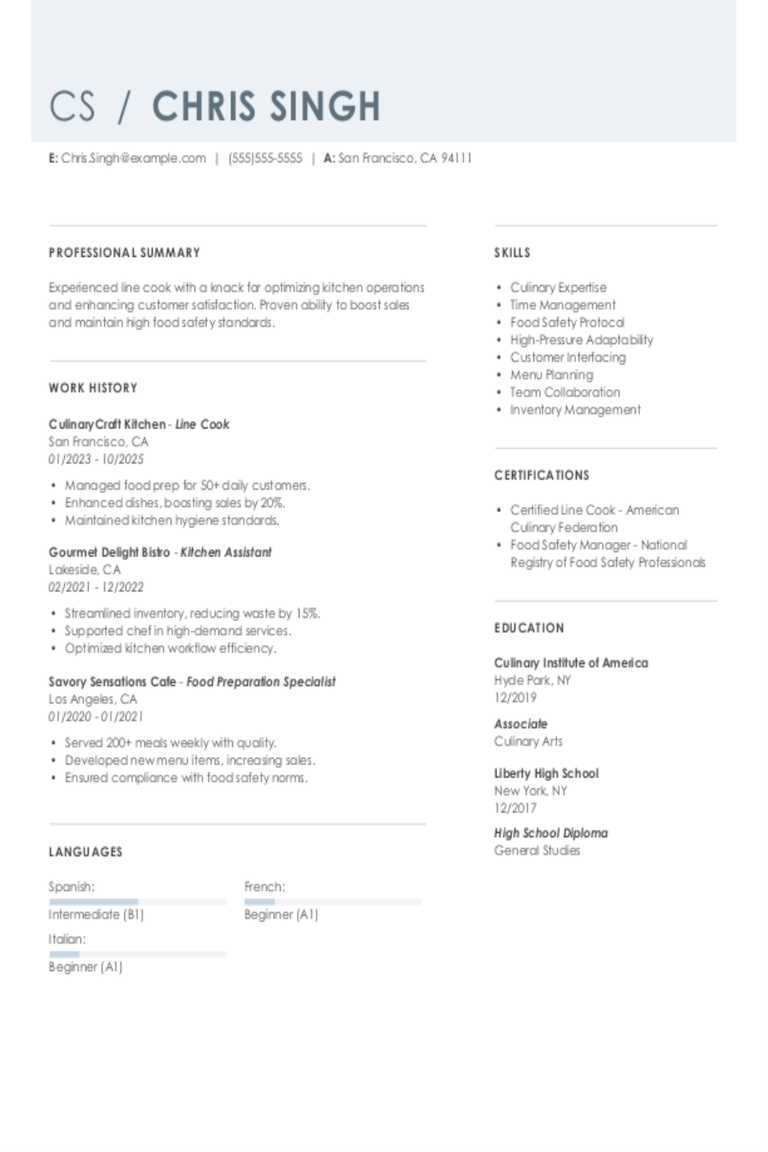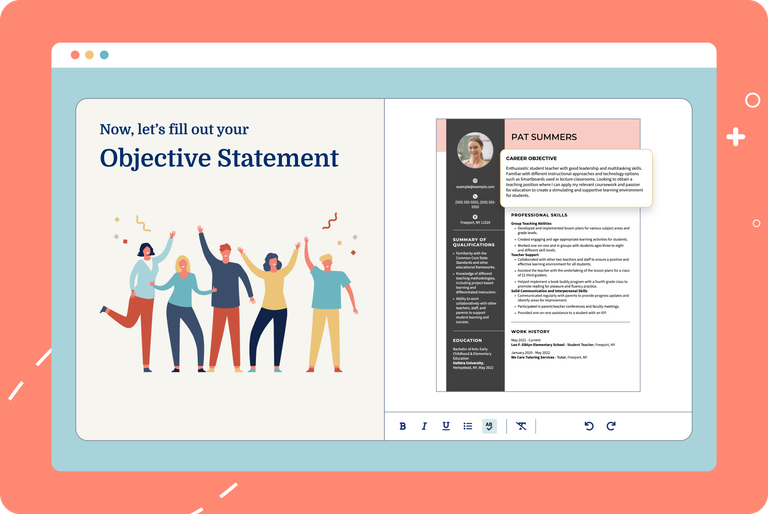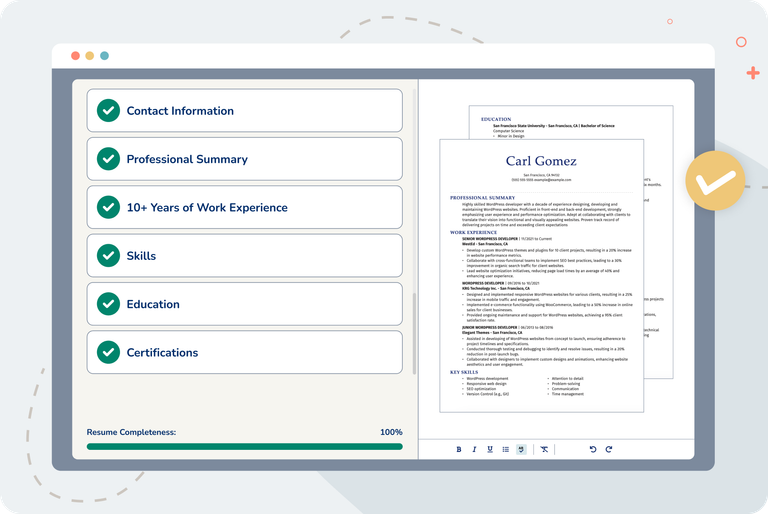Table of Contents
Get started with MyPerfectResume today!
- Build a resume on any device
- Pick an ATS-friendly template
- Tailor with AI copy suggestions
Why this resume works
- Quantifies accomplishments: The resume impressively quantifies accomplishments, such as a 15% waste reduction and a 20% sales boost, showcasing the job seeker’s tangible impact in previous roles.
- Highlights industry-specific skills: Industry-specific skills are well highlighted through achievements like food preparation consistency and sanitation standards, underscoring the job seeker’s expertise in the culinary field.
- Illustrates problem-solving ability: Problem-solving skills shine through examples of waste reduction and process improvements, reflecting the candidate’s resourcefulness and critical thinking in kitchen management.
More Cook Resume Examples
Review our cook resume examples to see how to emphasize your culinary skills, kitchen experience, and ability to create delicious dishes. These culinary resume examples provide a strong foundation for crafting a resume that highlights your passion for cooking.
Entry-level Cook
Why this resume works
- Features education section: The education section stands out with clear formatting, emphasizing academic achievements at the Culinary Institute of America, very important for early career recognition.
- Starts with a resume objective: The objective statement at the top of the resume is focused on what the applicant can bring to the role. This differs from a professional summary for being very forward-focused.
- Shows digital literacy: References to certifications such as ServSafe Food Handler highlight the candidate’s proficiency with industry standards and showcases valuable computer skills.
Mid-level Cook
Why this resume works
- Includes mix of soft and hard skills: The resume skillfully illustrates a blend of technical and interpersonal abilities through roles that demand both culinary precision and team training, highlighting a comprehensive professional toolkit.
- Demonstrates language abilities: Language skills in English, Spanish, and French underscore the candidate’s capability for cross-cultural communication, vital for working in diverse culinary environments.
- Displays technical expertise: Specialized certifications like ServSafe and Culinary Arts Certification reflect the candidate’s technical expertise and adherence to industry standards essential for high-level kitchen operations.
Experienced Cook
Why this resume works
- Showcases impressive accomplishments: Highlighting significant accomplishments shows senior-level impact through reduced food waste and new menu items leading to increased customer satisfaction.
- Focuses on work history: The chronological format of the work history section effectively emphasizes career progression, making it ideal for showcasing extensive experience in various culinary roles.
- Sections are well-organized: Using bullet points and clear headers ensures sections are well-organized, allowing the reader to quickly scan and understand key responsibilities and achievements.
Cook Resume Template (Text Version)
Hiro Huang
Albany, NY 12208
(555)555-5555
Hiro.Huang@example.com
Professional Summary
Experienced cook with 8 years in culinary arts, strong in kitchen management and team leadership, known for reducing waste and enhancing menu revenue.
Work History
Cook
The Golden Plate – Albany, NY
March 2022 – March 2025
- Prepared meals reducing waste by 15%
- Managed a team of 4 chefs
- Created new dishes boosting sales by 20%
Line Cook
Maple Leaf Dining – Buffalo, NY
March 2017 – March 2022
- Ensured consistency in all dishes
- Trained 5 new kitchen staff
- Improved the food prep process by 10%
Kitchen Assistant
Sunset Grill – Hillcrest, NY
March 2015 – February 2017
- Assisted in daily kitchen operations
- Maintained cleanliness reducing waste
- Prepared ingredients exceeding standards
Skills
- Food Preparation
- Kitchen Management
- Team Leadership
- Sanitation Standards
- Menu Development
- Inventory Control
- Cost Reduction
- Time Management
Education
Bachelor’s Degree Culinary Arts
University of Houston Houston, Texas
June 2015
High School Diploma
Lincoln High School Dallas, Texas
June 2013
Certifications
- Food Safety Manager Certification – National Restaurant Association
- Culinary Arts Certification – Culinary Institute of America
Languages
- English – Beginner (A1)
- Spanish – Intermediate (B1)
- French – Beginner (A1)
Popular Skills for a Cook Resume
The resume skills section is vital for highlighting both technical expertise and the soft skills essential for success as a cook. It should feature practical kitchen abilities like food preparation and safety, alongside interpersonal qualities such as teamwork and time management.
Below are a few of the top soft skills frequently listed on cook resumes.
| Soft Skills | % of resumes with this skill |
|---|---|
| Customer service | 73.08% |
| Food presentation | 19.15% |
| Positive and professional | 18.79% |
| Focused and disciplined | 13.53% |
| New hire training | 12.80% |
Here are a few examples of hard skills frequently included on cook resumes.
| Hard Skills | % of resumes with this skill |
|---|---|
| Cleaning and organization | 73.08% |
| Cooking | 69.23% |
| Food handling | 65.38% |
| Food preparation | 33.35% |
| Supply restocking | 27.21% |
Related Resume Guides
Advice for Writing Your Cook Resume
Writing a resume for a cook job doesn’t have to be complicated. I’ll show you how to make a resume that highlights your kitchen skills, experience, and love for cooking. Think of it like preparing a great dish — just the right ingredients in the right order. Let’s get started!
Write a strong professional summary
A professional summary serves as an initial snapshot of your skills and experience on your resume, especially for experienced cooks. This section highlights culinary expertise, notable achievements, and unique skills that distinguish you.
On the other hand, if you have limited work history, a resume objective is more appropriate. It outlines your career goals and their alignment with the job you’re pursuing. Highlight any relevant training or internships and showcase your enthusiasm.
For a cook position, include essential skills such as food preparation, menu planning, and kitchen safety. Clearly organize achievements by citing specific outcomes like increased customer satisfaction or reduced waste. Tailoring this section to the role of a cook with strong language will effectively capture the employer’s attention.
Cook resume summary examples
Entry-level
Recent culinary school graduate with a diploma in Culinary Arts from [School Name]. Certified in Food Safety and Sanitation, proficient in basic cooking techniques, knife skills, and kitchen equipment operation. Eager to contribute to a dynamic kitchen team, passionate about creating delicious dishes, and committed to maintaining high standards of food quality and hygiene.
Mid-career
Seasoned cook with over 7 years of experience in fast-paced restaurant environments, including fine dining and casual eateries. Skilled in menu planning, ingredient preparation, and supervising kitchen staff. Proven track record of maintaining high food safety standards while delivering exceptional culinary experiences. Adept at managing inventory and working efficiently under pressure.
Experienced
Accomplished culinary professional with more than 15 years of experience leading kitchen operations in top-tier restaurants and hotels. Expertise in international cuisines, advanced culinary techniques, and innovative menu development. Demonstrated leadership abilities in training and mentoring junior chefs, optimizing kitchen workflows, and ensuring consistent delivery of high-quality dishes. Recognized for excellence in culinary artistry and commitment to operational efficiency.
Cook resume objective examples
Recent graduate
Recent culinary school graduate with a passion for creating delicious and visually appealing dishes, seeking an entry-level cook position. Eager to apply my knowledge of modern cooking techniques and food safety standards in a fast-paced kitchen environment while contributing to the success of the culinary team.
Career changer
Dedicated professional transitioning into the culinary field, bringing strong organizational skills and a keen attention to detail developed in previous roles. Seeking an opportunity as a cook to leverage my newly acquired culinary training and contribute to a dynamic kitchen team committed to delivering exceptional dining experiences.
Specialized training
Aspiring chef with specialized training in international cuisine and pastry arts, seeking an entry-level cook position at a high-end restaurant. Passionate about utilizing creativity and technical skills to craft unique dishes that elevate the dining experience and exceed guest expectations.
Create a standout resume fast! Use our AI Resume Builder to highlight your cooking skills and experience easily.
Include relevant certifications and training
Listing credentials like certifications, licenses, and specialized training is crucial, especially in technical fields. For a cook, having these credentials shows employers that you have the necessary skills and knowledge to perform your job well. It also demonstrates your commitment to staying updated with industry standards and best practices.
Create a dedicated Certifications section on your resume and list your credentials prominently. This section can enhance your education section by showing additional qualifications that set you apart from other candidates. Examples of industry-recognized certifications for cooks include:
- ServSafe Food Handler
- Certified Culinarian (CC)
- Certified Pastry Culinarian (CPC)
- HACCP Certification
When listing these certifications, include the name of the certification, the issuing organization, and the date obtained. For example:
This clear organization makes it easy for employers to see your qualifications at a glance and understand your expertise in the culinary field.
Example of a certifications section
ServSafe Food Protection Manager Certification
Issued by: National Restaurant Association
Expires 2025
Certified Culinarian (CC)
Issued by: American Culinary Federation (ACF)
Issued 2022
Food Handler Certification
Issued by: State of California
Expires 2024
Allergen Awareness Training Certificate
Issued by: Food Allergy Research & Education (FARE)
Issued 2021
A combination resume format helps you highlight certifications right away while still showcasing your experience. It’s a great choice if meeting strict credential requirements is key to landing the job.
Showcase your work experience
Highlighting your work experience is key to making an impact as a cook. Arrange your work experience starting with your latest job first, as it helps hiring managers follow your career path and understand your current capabilities.
List each job by mentioning your title, the company’s name, location, and the dates you worked there. Use clear bullet points to detail your duties and accomplishments with action-oriented language. Focus on results that show your impact, like “Boosted kitchen efficiency by 20% through streamlined processes.”
Following these tips will help you effectively present your experience as a cook and make a positive impression on potential employers.
5 cook work history bullet points
- Prepared and cooked high-quality dishes for a 150-seat restaurant, resulting in a 20% increase in customer satisfaction ratings.
- Implemented inventory management practices that reduced food waste by 25%, saving the restaurant $10,000 annually.
- Trained and supervised a team of 8 kitchen staff, improving team efficiency and reducing order preparation time by 15%.
- Developed new menu items that increased sales by 10% and attracted new customers to the establishment.
- Ensured compliance with food safety standards, leading to a perfect score on health inspections for three consecutive years.
To pass applicant tracking systems (ATS) and catch recruiters’ eyes, use keywords from the job listing in your resume.
Match your resume with the job description
Customizing your resume to fit a job description will help you stand out by demonstrating that you possess the specific skills and experiences the employer seeks. Many companies use Applicant Tracking Systems (ATS) to screen resumes, so matching keywords from the job posting can enhance your chances of being noticed.
To create an ATS-friendly resume, you must first identify key phrases and words in the job posting. Look for terms like menu planning, food safety, or team collaboration. Naturally incorporate these phrases into your resume. For instance, if the job post mentions “preparing high-quality dishes,” you could phrase it as: “Prepared high-quality dishes following standardized recipes.”
Make sure your resume gets noticed! Our ATS Resume Checker helps you fix formatting issues and add important keywords so you can pass ATS software.
Salary Insights for Cooks
Top 10 highest-paying states for cooks (new data)
Cooks earn varying salaries across the United States, with a national average of $40,396. The table below highlights the states where cooks command the highest compensation.
Our salary information comes from the U.S. Bureau of Labor Statistics’ Occupational Employment and Wage Statistics survey. This official government data provides the most comprehensive and reliable salary information for writers across all 50 states and the District of Columbia. The figures presented here reflect the May 2025 dataset, which is the most recent available as of this publication.
| State | Average Salary |
|---|---|
| Idaho | $49,170 |
| Michigan | $48,160 |
| Nebraska | $47,960 |
| Washington | $47,120 |
| Minnesota | $46,020 |
| New York | $46,020 |
| Iowa | $46,500 |
| Alaska | $46,270 |
| California | $46,260 |
| Kansas | $45,300 |
FAQ
Do I need to include a cover letter with my cook resume?
Adding a cover letter to your cook resume can give you an advantage by allowing you to showcase your passion for cooking and why you’re interested in that specific restaurant or kitchen. Highlight unique skills, such as mastering a particular cuisine or thriving during busy service times. Mention relevant experiences, like special training or working in high-profile kitchens, that make you an exceptional candidate.
A cover letter also provides a chance to display your personality and enthusiasm, which is key in a hands-on job. Keep it concise and focus on aligning your background with the employer’s needs. This extra touch could set you apart from other applicants. For more assistance, check out our Cover Letter Generator or review some cover letter examples.
How long should a cook’s resume be?
For a cook, sticking to a resume length of one page is typically ideal. This ensures it remains concise and easy for hiring managers to quickly review.
If you have extensive experience or specialized training, a two-page resume is acceptable. However, make sure the most important aspects are prominent. Focus on recent roles and key achievements to create a strong impression.
How do you write a cook resume with no experience?
Creating a resume with no experience may seem daunting, but you can still emphasize your strengths and potential. Begin by highlighting your educational background, prominently listing any culinary courses or cooking workshops you’ve attended.
Then, focus on relevant skills. Even if you lack professional cooking experience, abilities such as food preparation, knowledge of kitchen safety and hygiene practices, knife handling skills, and basic cooking techniques are valuable.
Include any volunteer work that involved meal preparation or assisting with cooking tasks. Also, mention part-time jobs that demonstrate transferable skills like teamwork, time management, and attention to detail.
Ensure you add a compelling objective statement at the top of your resume to express your enthusiasm for cooking and eagerness to learn. This will convey to employers your passion for pursuing a career in the culinary field.
Rate this article
Cook
Share this page
Additional Resources

Line Cook Resume Examples & Templates
Explore line cook resume examples that showcase cooking skills and teamwork in busy kitchens. Browse tips to help you highlight your experience and stand out to employers.Build my resumeImport existing

Prep Cook Cover Letter Example + Tips
As demonstrated in the free prep cook cover letter sample, your cover letter will typically include a few simple topics. Successful cover letters will have an opening that states the

The Illusion of Wage Growth: Where Paychecks Stretch the Farthest
U.S. wages have climbed at one of the fastest rates in modern history. Between 2020 and 2024, the average American worker’s pay rose from about $64,000 to $75,600, an 18%

100+ Resume Objective Statement Examples & Best Practices
In just a sentence or two, a resume objective statement tells hiring managers the role or career path you’re aiming for and the unique skills and value you bring to

150+ Skills for a Resume: Examples for Any Job
Crafting a standout resume starts with highlighting the skills and qualifications that demonstrate your fit for the role. But in a crowded job market, knowing which abilities will actually catch

When to Use a Two Page Resume (With Examples & Formatting Tips)
If you’ve spent years building your skills, growing in your career, and racking up accomplishments, a one-page resume might not cut it. A two-page resume gives you space to present a
